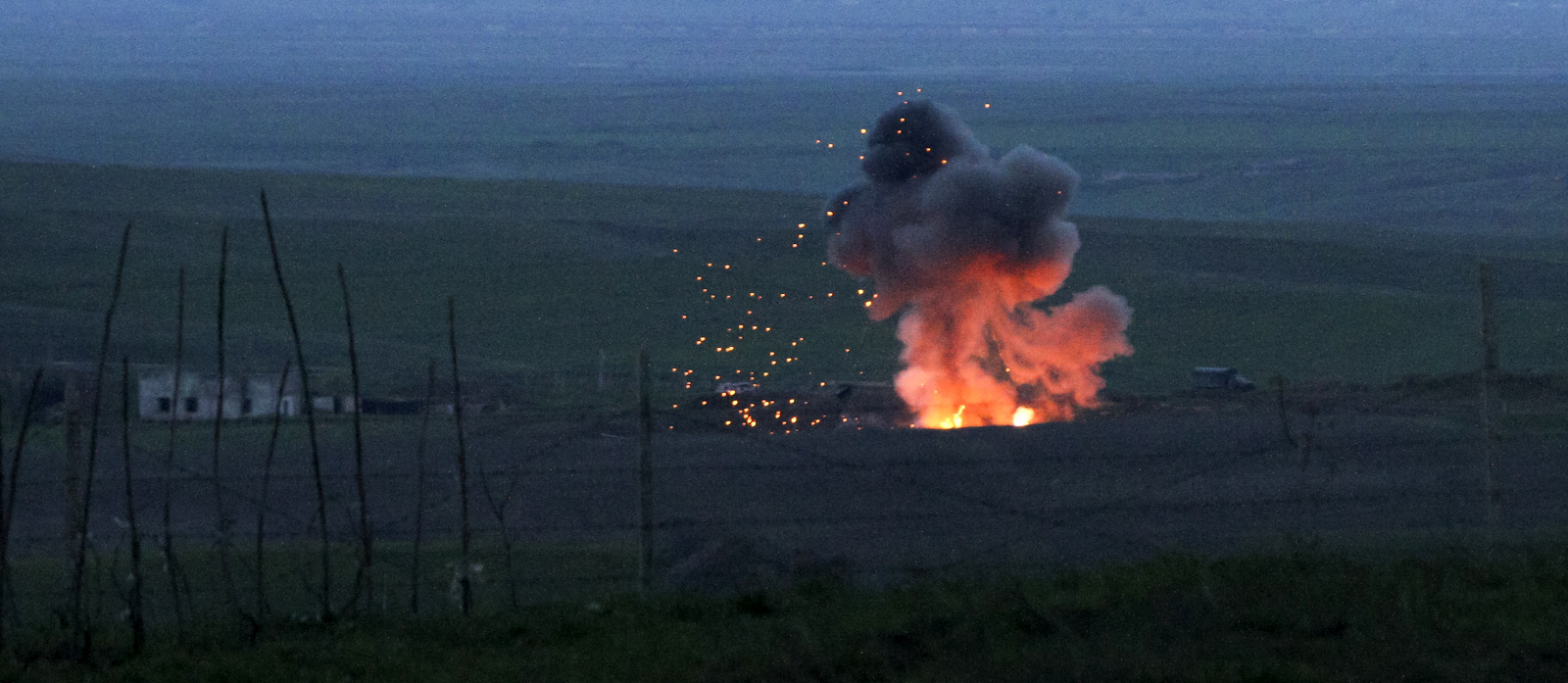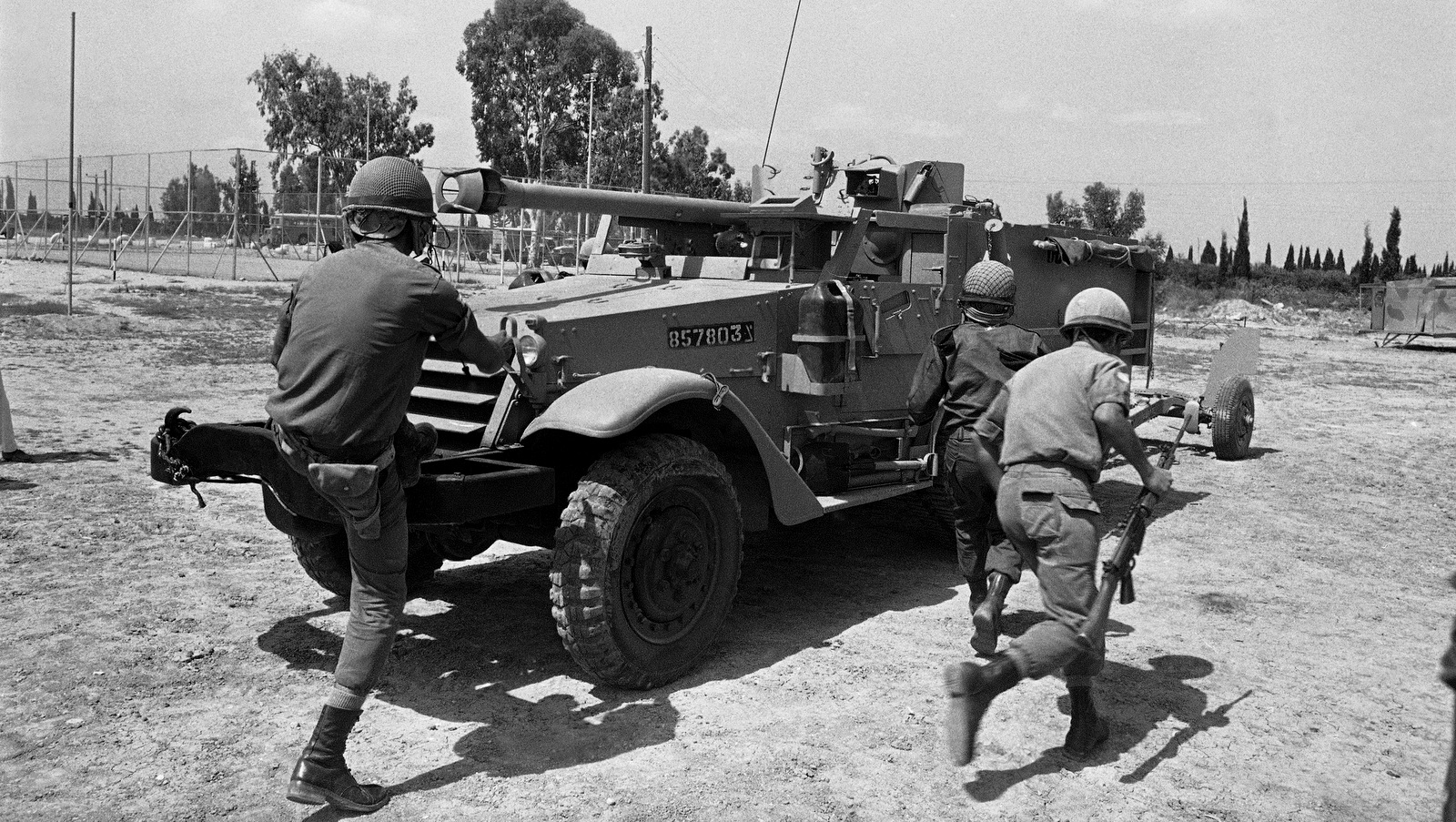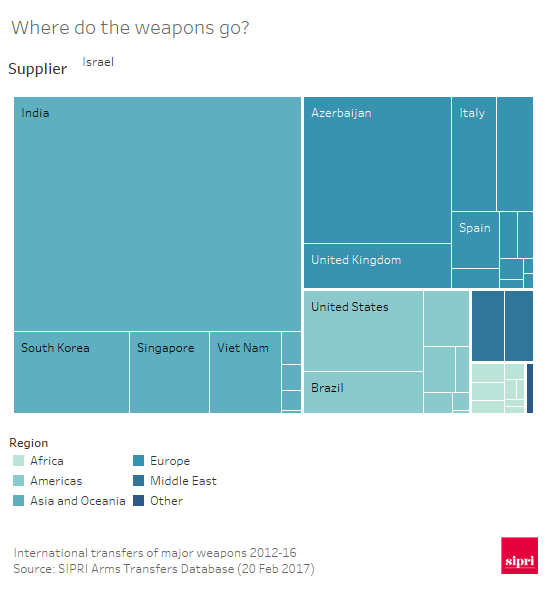An Israeli weapons contractor is being investigated for an alleged “live fire” test of a suicide drone in Nagorno-Karabakh, a territory whose ownership is disputed by Azerbaijan and Armenia. If the allegations of this drone’s use on Armenian soldiers are true, it would constitute a criminal act and one that testifies to the long reach of the growing military-industrial complex in Israel.
Israeli arms manufacturer’s weapons “test” in Azerbaijan


An explosion of a downed Azerbaijani drone in the Nagorno-Karabakh, Azerbaijan, April 4, 2016. The Nagorno-Karabakh military said it downed several Azerbaijani drones since fighting around the region erupted. (Vahram Baghdasaryan/Photolure)
In August of this year, reports emerged that a complaint had been filed with the Israeli Defense Ministry concerning the use of a “suicide drone” against Armenian troops. According to the complaint, the drone used against the soldiers was not actually the property of Azerbaijan’s armed forces but instead was being piloted by representatives of an Israeli arms manufacturer.
The company accused of this illegal involvement in an armed conflict is the privately owned Aeronautics Defense Systems (ADS).
It was reported at the time that ADS representatives were in the field with Azerbaijani forces when they were asked to demonstrate the drone on an Armenian army position. The drone pilots allegedly refused this request at first, which then led the managers on site to attempt the strike themselves.
ADS initially denied these allegations, stating, “The operational action was carried out by the purchaser alone and on its responsibility. Aeronautics has never carried out demonstrations on live targets, and that was true in this case as well.”
ADS also claimed that all of its sales have “approval from the Defense Export Controls Agency,” the branch of the Israeli Defense Ministry that monitors arms transfers.
Watch | Promotional video for Israel’s Orbiter 1k ‘suicide drone’
The Export Controls Agency has remained silent on the matter, stating they don’t comment on ongoing investigations. However, two weeks after the initial complaint was filed, exports of ADS suicide drones were frozen.
A police investigation into the events in Azerbaijan may also be underway: it was announced that the Israeli police are looking into the activities of ADS, although they did not specify which ones. Israeli courts have issued a gag order on the investigation, but even the initial police statement was vague, announcing only that “An investigation is ongoing against Aeronautics Defense Systems Ltd. in regards to a deal with a significant customer.”
Details of this police investigation are likely to remain sparse if history is any guide. The Israeli arms industry has had decades of investigations into its questionable practices and deployments — investigations not limited to private manufacturers. Even state-owned entities — such as Israel Aerospace Industries (IAI), founded by former Prime Minister Shimon Peres — have had run-ins with international law, leaving CEOs barred from travelling to allied countries like the U.S. Azerbaijan is not so much an anomaly as it is a part of the Israeli arms market’s history, especially in the post-9-11 world.
The evolution of the Israeli arms market


Israelis mount a 90mm self-propelled anti-tank gun on a conventional halftrack in Israel on May 7, 1970. The highly mobile gun was able to be quickly dismounted and placed on a gun carriage and boasted firing rate of 6 to 8 rounds per minute. (AP Photo)
Israeli weapons manufacturers obviously didn’t start out seeking to be the world’s tenth largest arms exporter. Initially, Israeli arms companies (some of which still exist today) began by supporting Zionist insurgents operating in Palestine.
These companies remained on the scene in Israel all through the British occupation of Palestine — operating in secret locations, including in underground tunnels. Under the British colonial laws in Palestine at the time, Jews could not be armed and faced harsh penalties, including death, if caught with weapons.
Yet, once the state of Israel was officially recognized by the European powers, arms began to flow in from the continent. While the U.S. was not yet at this point aiding Israel in any meaningful way, nations like France were arming the country in hopes that the Israelis would bolster their control in the region by fighting the growing resistance movements of the time, such as Arab nationalism.
Prior to France’s getting involved with Israel, the nation was relying on the aforementioned weapons produced in impromptu workshops and planes created from salvaged and stolen parts. Yet when France got involved all of this changed and Israel found itself with not only better guns and planes but also high-level secrets such as key pieces of nuclear technology.
France was still trying to balance both sides of the Arab-Israeli conflict well into the 1960’s, in a strategy that seems similar to that of the United States today. This all ended following the 1967 Six-Day War between Israel and its Arab neighbors. Forced to choose a side, France backed the Arab nations, placing an arms embargo on the region that was primarily directed at Israel, leaving the Israeli government back in a position similar to where they started.
It is around this time that the U.S. stepped in to aid Israel with the hopes of fighting communism in the Middle East, following the tightening of the relationship between Egypt and the Soviet Union. Despite Israel’s sinking of a U.S. warship during the Six-Day War, Washington viewed the young state as a place to sell weaponry to counter sales made by the Soviets in other countries in the region, once again leaving the Israeli domestic arms industry in the background.
While the relationship between Tel Aviv and Washington was far from smooth during the Cold War; after the fall of the Soviet Union, things began to change.
With the U.S. no longer focused on communism, its foreign policy began to focus on extremist groups in the Middle East. Israel may have been viewed as a troublesome partner in the Cold War but Tel Aviv was well prepared to help the U.S. in this new capacity.
Following this seismic geopolitical shift, Israeli arms manufacturers began to invest their efforts in becoming specialists in an industry that had plenty of potential for growth: ‘national security’ technology.
Since 9/11, Israeli arms used in political repression worldwide


Israeli girls write messages on a bombs at a heavy artillery position near Kiryat Shmona, in northern Israel, next to the Lebanese border. (AP/Sebastian Scheiner)
After the Cold War, Israel began exporting arms and technology to aid governments across the world in silencing political opposition. As no western countries yet wanted any of the Israeli technology in the late- and post-Cold War periods, these manufacturers started off with smaller nations looking to preserve regimes, such as apartheid South Africa.
However, it was one event that brought Israel into the wider global arms trade and brought relations with the U.S. to the level they’re at now. This was, of course, September 11, when the War on Terror spawned a need for crucial Western allies in the Middle East.
In these conditions, Israel not only began offering the latest technology to monitor and control populations, but they also more frequently began to showcase their innovations in their own backyard first. Following the newly locked-in relationship with the U.S. in the new global war, Israel began to act against groups it deemed terrorist threats on its borders.
Nowhere is this more obvious than in the Palestinian territories, where Israel often tests its latest weapons before they go on the market. Take, for example, the Israeli rockets and missile defense systems that are displayed for the global audience during conflicts with Gaza — weapons that are later purchased by countries, such as India or Saudi Arabia, fighting conflicts similar to Israel’s.


The top destinations of Israeli-made weapons from 2012-2016. (SIPRI Arms Transfers Database)
Israel also sticks to its tradition of selling to smaller rogue states that most Western countries wouldn’t dare directly arm. For example, Israeli weapons can be found all throughout Southeast Asia — such as in Myanmar, where Israeli weapons were sold to the military currently killing the Rohingya Muslims in violation of a U.S. and EU embargo.
This was also the case in South Sudan where, prior to 2014, a UN report said there was ample evidence that “illustrates the well-established networks through which weapons procurement is coordinated from suppliers in Eastern Europe and the Middle East and then transferred through middlemen in eastern Africa to South Sudan — suppliers that included Israel.
Israel also showcases other technologies, such as the airport-style security placed around al-Aqsa mosque in July, or the occupation-style security on display at military checkpoints in Palestinian territory.
Israeli occupation technology has even gotten attention from U.S. President Donald Trump, who is currently considering an Israeli firm to build a border wall with Mexico. Trump went so far as to use the Israeli wall as inspiration for his executive order to construct the U.S. version, saying “The wall is necessary…That’s not just politics, and yet it is good for the heart of the nation because people want protection and a wall protects. All you’ve got to do is ask Israel.” To show that this is further connected to the concept of ‘national security,’ Trump also claimed that Israel “saw something like over a 90 percent reduction in terrorist acts in that country that they attribute to having an effective fence.”
The business of occupation is also sold through training programs in Israel, which often find Israeli police and soldiers training U.S. police officers, including departments such as the Baltimore city police, who were found to consistently violate civil rights by the U.S. Department of Justice. There are even classes at U.S. universities sponsored by Israeli arms dealers, where students are offered a chance to “study with top Israeli preparedness experts to discuss a range of issues and scenarios.”
As the Israeli domestic arms industry has grown, it has evolved into a massive sector of the economy. One upshot is that it’s not just in Gaza that Israel shows off its latest weapons. Israel is now playing by the same playbook as the larger nations, which includes sales tactics like defense contractors showcasing weapons in the field — in non-neighboring places like Azerbaijan. This also extends to the more corporate events you’d expect from a military industry, such as massive international arms shows hosted by Israel, which are increasing in size every year.
It’s this growing military-industrial complex that moved Israel to the number 10 spot among global weapons exporters. The growth of these exports shows every year too, with the export market going from $5.7 billion in 2015 to $6.5 billion in 2016.
It is in this context that we should view the accusation against the Israeli arms dealer in Azerbaijan. While we don’t know for sure what happened in Nagorno-Karabakh, we do know that the allegations made fit perfectly into a pattern of cynical and unethical behavior by the Israeli military-industrial complex.
Top photo | Israeli girls write messages in Hebrew on shells ready to be fire by mobile artillery unit into southern Lebanon 17 July 2006, at a military staging area along the northern Israeli border.
<!–
–>
Source Article from http://www.mintpressnews.com/israeli-arms-industry-grows-so-does-its-global-testing-range/234996/
 RSS Feed
RSS Feed















 December 1st, 2017
December 1st, 2017  Awake Goy
Awake Goy 
 Posted in
Posted in  Tags:
Tags: 













